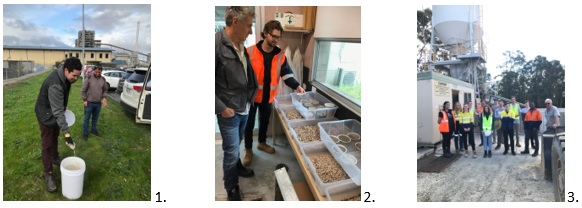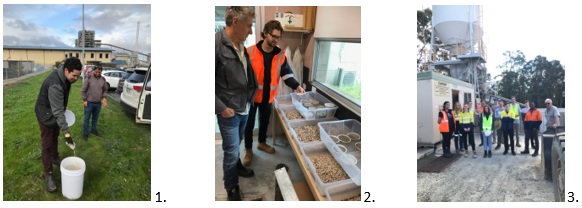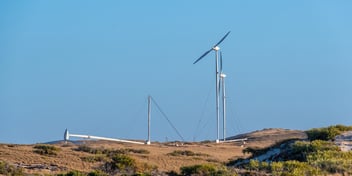Pathfinders for WA’s post-COVID economic recovery

A group of Murdoch University’s environmental engineering students are working in teams and responding to the COVID-19 and economic crises by developing technology innovations that could underpin new industries and future businesses.
These smart young students are working on 4 innovations that could be new pathways to economic development and job creation in Western Australia:
- Low carbon eco-concrete;
- Affordable timber tiny houses;
- Solar powered water treatment;
- Greywater recycling auto-pilot.
One team of students is developing an entirely new approach to concrete by firstly making geopolymer cement in a unique chemical reaction and then adding to it recycled aggregates to create a new product that reduces carbon emissions by 80% compared to normal Portland Grey Cement while at the same reducing costs by 20% and increasing strength by 20%. The students have been visiting Collie and forging strong relationships with civic leaders connected to coal mines and power stations were vast quantities of waste flyash is produced from burning the coal – this is the raw material for the unique geopolymer cement. As these power stations start to shutdown in the energy transition and jobs are lost a new industry can be created at the same time to produce this eco-concrete and create many more jobs. At the same time the students have been eying off the vast stockpiles of construction & demolition wastes sitting idly around Perth with no markets and high tipping fees discouraging their disposal – this is the future aggregate for vast quantities of future eco-concrete. The students are passionate and have already won several innovation competitions.
 Murdoch students collect flyash from Bluewater power station in Collie to make geopolymer cement(1), preparing different grades of recycled aggregate & sands ready for mixing into eco-concrete, and the students meeting with Pilatti Bros concrete makers in Collie to discuss how to get ready for the first batch of eco-concrete.
Murdoch students collect flyash from Bluewater power station in Collie to make geopolymer cement(1), preparing different grades of recycled aggregate & sands ready for mixing into eco-concrete, and the students meeting with Pilatti Bros concrete makers in Collie to discuss how to get ready for the first batch of eco-concrete.
For many millennial students graduating today there is often little hope of achieving previous generations home ownership levels. Now a range of new housing models are being spawned on the market entirely different to the previously dominant single detached house in the outer suburbs – and of a much higher environmental performance than this previous low standard. The “tiny house passivhaus” model is being developed by another team of students and following in the German footsteps this will have a high environmental performance and low carbon footprint through the use of advanced timber materials. The students are checking out leading examples underway around Perth and Bunbury and discussing their ideas with an advanced timber manufacturer near Collie. The goal is to develop an entirely new approach to affordability and sustainability in housing. Solar house expert and tutor to the students, Dr David Goodfield, explained “a key element to this team’s approach is to design the house to make use of free energy from the sun – even this one simple technique, so under-utilised in Perth, will reduce winter heating bills enormously”.
 Murdoch students visit the extraordinary new timber Dehavilland Apartments in Midland (1), where they inspect the advanced timber beams made in Perth from local wood (2) and check out the basement (3) which serves as a virtual power station housing a battery bank while solar panels are rooftop enabling peer-to-peer energy trading between residents and the grid.
Murdoch students visit the extraordinary new timber Dehavilland Apartments in Midland (1), where they inspect the advanced timber beams made in Perth from local wood (2) and check out the basement (3) which serves as a virtual power station housing a battery bank while solar panels are rooftop enabling peer-to-peer energy trading between residents and the grid.
Meanwhile, group 3 gets ready to present its new approach on water supply from increasingly saline rivers and brackish groundwater in the southern wheatbelt region. These students are combining solar power with new lower-cost, high-efficiency reverse osmosis membranes and advanced monitoring techniques, deployed in multiple plants across the region from a possible new workshop in Collie, to develop a new delivery and maintenance model across the region. Could this be another new industry and job creation scheme for Collie transition town? Dr Vishnu Ravisankar, Murdoch desalination expert and the students tutor, says “while the larger support structures of agencies like Water Corporation will continue, with our drying climate, there will be an increasing role for small-scale desalination plants, at least on an intermittent basis. The students work will explore one possible avenue”.
 The portable solar-powered water desalination kit (1) that the Murdoch students use for demonstration and learning, was acquired from industry partner Moerk Water in whose workshop (2) Murdoch students work as interns and get to assist on larger scale deployments of this technology into the Wheatbelt with Dr Ravisankar (3).
The portable solar-powered water desalination kit (1) that the Murdoch students use for demonstration and learning, was acquired from industry partner Moerk Water in whose workshop (2) Murdoch students work as interns and get to assist on larger scale deployments of this technology into the Wheatbelt with Dr Ravisankar (3).
Also in the drying climate are our parched suburbs in summer screaming out for more irrigation to enable urban greening with vegetation cover in order to create cooler micro-climates. With sprinkler restrictions in place every summer now this is not always possible. Thus, the fourth team of students are focussed on an untapped resource, greywater, to provide this as an unrestricted source of irrigation through an entirely innovative approach. The students are examining advanced sensors to insert into a new diversion device to enable extraction of less contaminated greywater from the sewer for home and broader urban irrigation systems. Firstly, the students have been watching closely other Murdoch engineering graduates employed in the Shire of East Pilbara on a 5-house retrofit trial for greywater irrigation. Secondly, they will take these learnings into the new Hamilton Hill estate development to devise an urban village scale greywater solution. If this challenge can be tackled successfully then the next goal is to develop an approach to whole town retrofit and a new water industry development in Collie. Dr Stewart Dallas, adjunct and industry advisor to Murdoch students from the Greywater & Wastewater Industry Group predicted “with greywater largely an untapped resource so far, in the drying climate of southwest WA, these students are innovating a potentially revolutionary technology that could enable essentially free irrigation in summer. This in turn can reduce scheme water consumption by up to 30%”.
 Murdoch students visit a rare operational greywater recycling plant (1) before developing their own test rig in the Murdoch lab (2) and then visit the Hamilton Hill development underway with sewer installation and diversion device (3) ready for conversion with advanced sensor technology.
Murdoch students visit a rare operational greywater recycling plant (1) before developing their own test rig in the Murdoch lab (2) and then visit the Hamilton Hill development underway with sewer installation and diversion device (3) ready for conversion with advanced sensor technology.
Murdoch University has a vigorous innovation and business start-up program called Launchpad that operates out of the Library. Murdoch environmental engineering students have been highly active in this innovation program developing new technologies related to aquaponics, greywater reuse and eco-concrete.

